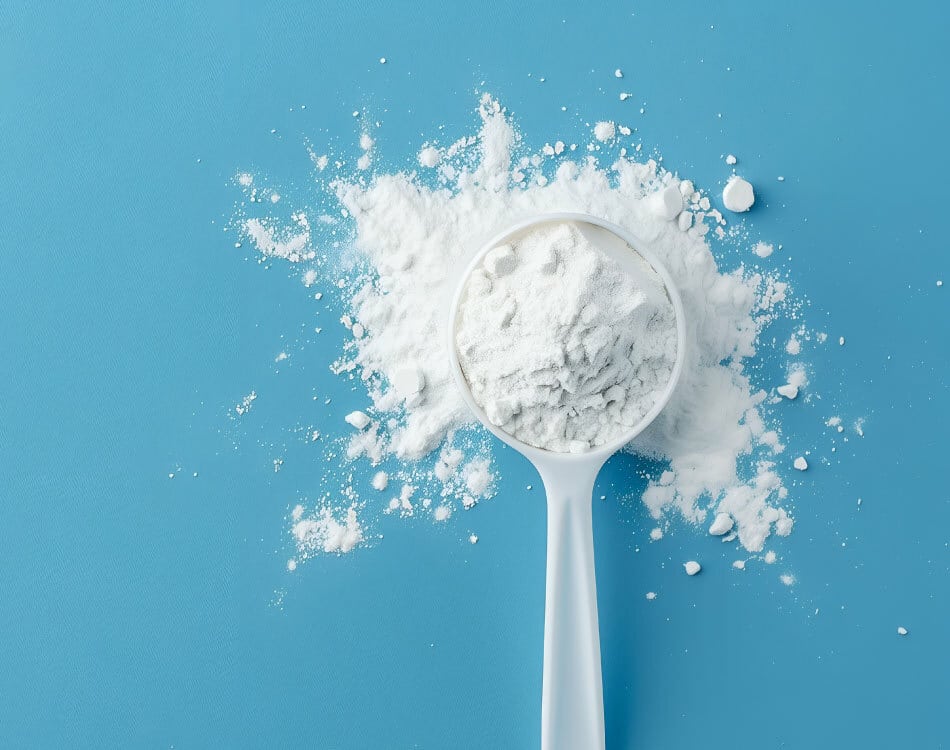Are you navigating the challenges of menopause and looking for ways to improve your quality of life? Discover how creatine can enhance muscle mass and overall health for women during menopause.
Creatine is a powerful supplement that can enhance muscle mass and training capacity for both men and women at any age.
Women Get Bigger Creatine Benefit
As the most studied supplement on the market, research continues to confirm that creatine is safe and well-tolerated by both men and women, with benefits for both sexes1.
In fact, some research suggests that it could offer women more benefits because they typically store less creatine – 70–80% less – than men2 due to their lower muscle mass (we store creatine predominantly in muscle cells and some in the liver).
One study2 found that a creatine supplement may be particularly important for women during menstruation, pregnancy and post-partum due to “hormone-related changes” in how the body uses and produces creatine.
Potential Creatine Benefits for Women
- Enhances muscle mass
- Improves training capacity
- Supports overall health
Creatine Helps Maintain Muscle
Another critical period in a woman’s life is before, during and after menopause. About 1.5 million women experience the menopause transition each year, which often involves troublesome symptoms, including hot flashes, insomnia, fatigue, and joint pain3.
Several hormonal changes during menopause significantly impact a woman’s body composition through muscle loss, with declining oestrogen levels the most significant.
The resultant loss in muscle mass (a condition known as sarcopenia) can begin as early as your thirties, with women losing 3-8% of their muscle mass per decade, with that rate increasing after 604.
Using Creatine During Menopause
Studies show that combining a creatine supplement with resistance training can benefit perimenopausal, menopausal and postmenopausal women by helping to counter the loss in muscle, bone density, and strength that typically accompanies the condition2.
In one study2, researchers found that pre-menopausal women improved their strength and exercise performance when they took a creatine supplement.
Post-menopausal women who took higher doses (0.3 g·kg-1·d-1) also experienced benefits by developing more muscle and improving muscle function when taken alongside resistance training, which led to favourable effects on bone density.
Based on their findings, the researchers concluded2 that creatine “augments body composition and bone mineral density, particularly in post-menopausal females”.
But creatine doesn’t only help build muscle. It also has a muscle-sparing effect5. Its ability to slow muscle loss and maintain muscle as you age is vital to supporting your quality of life with better functional strength and mobility.
Taking A Creatine Supplement
To reap the benefits of creatine, use a product like creatine monohydrate consistently with a cycled protocol.
Dis-Chem Living Fit recommends
- Biogen Creatine Monohydrate
- USN Pure Creatine Monohydrate Powder
- NPL Creatine Monohydrate
- Primal Creatine 5000
Always follow label recommendations on your preferred brand around dosing, but most recommendations are a daily dose of up to 5 grams, taken with water or a carbohydrate-containing beverage.
Before starting any new supplement, including creatine, it’s advisable to consult with a healthcare professional, especially if you have underlying medical conditions or concerns about how it may interact with other medications or supplements you are taking.
References:
- Kreider RB, Kalman DS, Antonio J, Ziegenfuss TN, Wildman R, Collins R, Candow DG, Kleiner SM, Almada AL, Lopez HL. International Society of Sports Nutrition position stand: safety and efficacy of creatine supplementation in exercise, sport, and medicine. J Int Soc Sports Nutr. 2017 Jun 13;14:18. doi: 10.1186/s12970-017-0173-z. PMID: 28615996; PMCID: PMC5469049.
- Smith-Ryan AE, Cabre HE, Eckerson JM, Candow DG. Creatine Supplementation in Women’s Health: A Lifespan Perspective. Nutrients. 2021 Mar 8;13(3):877. doi: 10.3390/nu13030877. PMID: 33800439; PMCID: PMC7998865.
- Santoro N, Epperson CN, Mathews SB. Menopausal Symptoms and Their Management. Endocrinol Metab Clin North Am. 2015 Sep;44(3):497-515. doi: 10.1016/j.ecl.2015.05.001. PMID: 26316239; PMCID: PMC4890704.
- Volpi E, Nazemi R, Fujita S. Muscle tissue changes with aging. Curr Opin Clin Nutr Metab Care. 2004 Jul;7(4):405-10. doi: 10.1097/01.mco.0000134362.76653.b2. PMID: 15192443; PMCID: PMC2804956.
- Myoprotective Potential of Creatine Is Greater than Whey Protein after Chemically-Induced Damage in Rat Skeletal Muscle. Nutrients. 2018 May; 10(5): 553. Published online 2018 Apr 30. doi: 10.3390/nu10050553.
- Creatine and Phosphocreatine: A Review of Their Use in Exercise and Sport. J Athl Train. 1997 Jan-Mar; 32(1): 45–51.
















